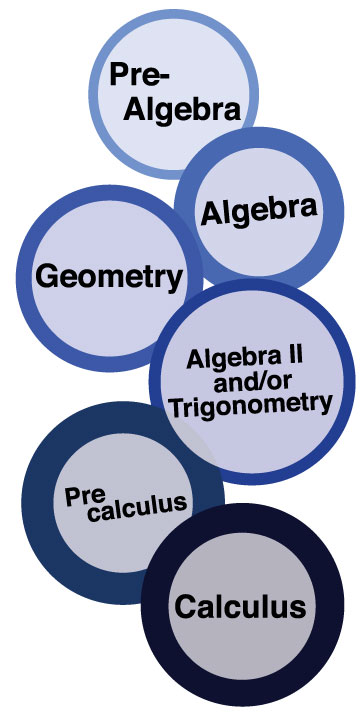If your kid is about to enter high school, or somewhere in the middle, you might be wondering, “Which math classes should my high schooler take?”
Do they need to take math all four years?
What’ll look good on their college application?
What if they want to be an engineer?
What if they want to be an artist?
Read on for the answers.
Take math all four years
I know, I know. Maybe your kid is hoping to skip math your sophomore year so they can take two electives. Or they want an easier senior year, and you’re trying to check math off their course list.
But Collegeboard and the National Association for College Admission Counseling (NACAC) say otherwise.
According to Collegeboard,
“Most colleges want students with [at least] three years of high school math. The more competitive colleges prefer four years.” (source)
Yep. Need more?
Well, aside from the college admission benefits your child will get from having a full, four-year schedule of math, they’ll also get academic benefits.
In fact, students who take math all four years are way more successful in college than students who only took three years.
This is mainly because your student could lose their momentum. NACAC warns,
“If you do not take math in your senior year, you will find that the math classes required in college will be very difficult!” (source)
Not to mention that math is an incredibly important skill, and a tool your student will definitely use for a bunch of other classes. (“Your High School Classes,” NACAC)
Still need some convincing? Okay, I’ll bring out the big guns.
The fancy-dancy Yale admissions officers note that if your child is looking to get into an Ivy League School (they note Yale specifically, but you can read it as just about any competitive school)…they can’t take an easier schedule senior year.
Sorry.
The folks at Yale admissions say,
“If you wish to make your application among the most competitive, you must take a challenging senior program and continue to excel in it.” (source)
General classes to take and why
So. Now that I’ve convinced you that your student needs to take math classes all four years of high school, you might be rolling your eyes.
“Okay,” you’re saying. “So, fine. They’ll take four math classes. But which ones?”
I’m glad you asked.
Their best bet is to take at least four of the following six classes, taken in the order shown below.
Why this particular order? Well, the classes at the top of the list help build important skills your child will need for classes lower down on the list.
Also, Algebra and Geometry are really helpful with college entrance exams and in college math classes. A quick tip from Collegeboard— “Take them early, so you’ll have time for advanced science and math, which will help show colleges you’re ready for higher-level work.”
But does your child need to take calculus? What if they only make it up to Trig?
Well…they’ll probably be okay for a regular college.
But if they’re looking to get a really great education at a selective school, your student should really aim for Calculus.
The folks at Oberlin (an incredibly selective liberal arts school in Ohio) have something to say about this:
“Most of the students who are admitted [to Oberlin] have completed four years of math in high school, through a minimum of Pre-Calculus. The majority completed Calculus.” (source)
Okay–so maybe your kid isn’t even thinking about highly selective schools.
But what if they change their mind junior year, and they’ve just finished Geometry, and Calculus looks out of reach?
The best plan of action is to take as much math as possible, so they can keep those doors open.
What’s a good way to fit all these classes in?
Well…
- Start Algebra in the 8th grade.
- Sometimes, high schools also let students take Geometry/Algebra or Geometry/Algebra II as a package.
- AND, of course, there’s always summer school and community college.
When to take more rigorous classes
So there you are! You know why your student should take math all four years, and you know they need to aim for calculus.
But what if they love math?
Let’s say your student is dying to go to MIT and get an engineering degree. They’ve got MIT posters on your wall, and they’re president of the engineering club at their school, and took first place in the robotics competition last year.
Go them! That’s amazing and impressive…and your student can differentiate him or herself even more by taking more math classes.
If your child is already interested in engineering or science, they’ve probably already been a little bit ahead in their math classes, and might even finish Calculus their junior year.
If they do, don’t let them take their senior year off! (See section 1. Heavens.) Instead, encourage them to top off their high school transcript with a class like:
- AP Statistics
- AP Computer Science
- Multi-Variable Calculus
Or, let’s look at the other side of the coin.
Maybe they love math…but their school doesn’t have Advanced Placement (AP) classes. Or maybe their school offers an International Baccalaureate (IB) program instead. Or maybe they only have one math teacher, and that teacher certainly doesn’t offer a class on Statistics.
Are your student’s dreams of going to an elite university totally sunk?
Well, not necessarily.
According to Yale admissions,
“Does your school offer AP courses? An International Baccalaureate program? Both? Neither? We know you did not design your school’s curriculum, and we only expect that you will excel in the opportunities to which you have access.” (source)
Long story short: for the best chance of getting into an elite university, make sure your student takes full advantage of the math opportunities that their school offers!
Conclusion
So, if you’re wondering what to do about your high schooler’s math classes, here’s the gist:
- Take math all four years!
- If possible, have them start Algebra early, and take Calculus their junior or senior year.
- If they want to pursue a math or science degree, encourage them to take a more advanced math class senior year.
- If their school doesn’t offer advanced classes, just make sure they excel in the classes that are offered.
Keep that in mind, and your student is so much closer to attending the college of their dreams!
Which colleges is your high schooler dreaming about? Let us know in the comments!
Dressler Parsons
Latest posts by Dressler Parsons (see all)
- When Should My Student Start Planning For College? - January 22, 2015
- Which Math Classes Should My High Schooler Take? - January 13, 2015
- Why Did My SAT Score Go Down? - January 12, 2015
- Should I Take the SAT or the ACT? - November 19, 2014
- 7 Questions to Discover Your Personal SAT Prep - November 13, 2014



This is a really great post and really useful information to know about!
Thanks!
How many math’s are there in Math ?
I don’t know? Good question! 😉
Nice blog, helpful for students to know about the math classes.
Thanks for reading Leesa! 🙂
Thanks! I’ll check out the resources you offered, and call in!
My kid likes math, took Stats, Calc I and II in Freshman and Sophomore year, then Diff Eq (4.0 grade) at a public university Junior Year. Senior year will be more university maths – Matrices and Linear Algebra and then maybe Number Theory spring semester. Any colleges on your radar for a very normal, mellow kid that has only hints of what major will appeal? Is Calc III necessary now, or can it wait for necessity in college classes? All the courses taken so far have been kid-planned and chosen…
Kate, The best (and briefest) way I can address your questions is to recommend that you call our main line to speak with an Academic Advisor: 1-844-50-TUTOR. They have extensive experience of working with students and their parents to discern where they are at as far as academics, college applications, etc. They can look at your student’s academic profile in depth and give you more detailed and specific answers in regards to things like schools who offer certain majors/programs and take strong math skills into high consideration for admissions. However, keep in mind that your student does not necessarily need… Read more »